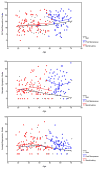Gender differences in gastrointestinal, psychological, and somatic symptoms in irritable bowel syndrome
- PMID: 18979200
- PMCID: PMC3569485
- DOI: 10.1007/s10620-008-0516-3
Gender differences in gastrointestinal, psychological, and somatic symptoms in irritable bowel syndrome
Abstract
In the United States, more women than men seek health-care services for symptoms of irritable bowel syndrome (IBS). A number of explanations are given for this gender difference including the higher rates of somatic non-gastrointestinal symptoms and increased psychological distress reported by women with IBS. However, these gender differences are found in studies that rely on retrospective recall with little attention to age or reproductive status. The purpose of the current analysis was to prospectively compare the frequency (days/month of moderate to severe based on a daily diary) of somatic, gastrointestinal (GI), and psychological distress symptoms, in menstruating women (N = 89) and postmenopausal women (N = 66) to men (N = 32) with IBS. In addition, the correlation between daily symptoms and daily report of overall health was evaluated. Postmenopausal women reported significantly more GI pain/discomfort symptoms, especially bloating and abdominal distension, than men, however these differences are greatly attenuated when age is controlled for. Both postmenopausal and menstruating women reported significantly more somatic symptoms (especially joint pain and muscle pain) than men with IBS. The effect was stronger in postmenopausal women, whose somatic symptoms were also higher than menstruating women (P = 0.014). Fatigue and stress were higher in women than men but anxiety and depression were not. All three types of symptoms were strongly correlated with self-rating of health, both across and within-person. Gender-related differences in GI and somatic symptoms are apparent in persons with IBS, more strongly in postmenopausal women. The presence of somatic symptoms in postmenopausal women with IBS may challenge clinicians to find suitable therapeutic options.
Figures


References
-
- Drossman D, Corazziari E, Thompson W, et al. Rome II: The functional gastrointestinal disorders. 2. McLean, Degnon Associates; 2000.
-
- Chial HJ, Camilleri M. Gender differences in irritable bowel syndrome. J Gend Specif Med. 2002;5:37–45. - PubMed
-
- Chang L, Toner BB, Fukudo S, et al. Gender, age, society, culture, and the patient’s perspective in the functional gastrointestinal disorders. Gastroenterol. 2006;130:1435–46. - PubMed
-
- Lee OY, Mayer EA, Schmulson M, et al. Gender-related differences in IBS symptoms. Am J Gastroenterol. 2001;96:2184–93. - PubMed
-
- Whitehead WE, Palsson OS, Levy RR, et al. Comorbidity in irritable bowel syndrome. Am J Gastroenterol. 2007;102:2767–76. - PubMed
Publication types
MeSH terms
Grants and funding
LinkOut - more resources
Full Text Sources

